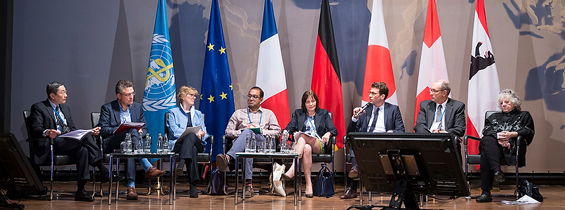Event
Event Report: Global Health R&D featured at 2015 World Health Summit

Held annually in Berlin, the World Health Summit is a prominent international forum for addressing global health issues, convening 1200 leaders from academia, politics, civil society, and the private sector, hailing from 80 countries, to address the most pressing health-related challenges on the planet. In 2015, the Summit featured GHIT’s CEO and Executive Director on its mainstage, as well as a focused session on Global Health R&D, co-moderated by GHIT’s Director of Investment Strategy and Development.
The October 2015 Summit formed an important milestone in the arc of recent global health events, with the Ebola epidemic persisting in Africa, the launch of the Sustainable Development Goals (SDG) agenda, and Germany’s G7 presidency. Indeed, Ministers of Health from G7 nations convened on the sidelines of the Summit as part of the G7 process.
On the first day of the Summit, the GHIT Fund and Drugs for Neglected Diseases initiative (DNDi) co-convened a targeted Global Health R&D workshop, which addressed the magnitude of the infectious disease problem in low- and middle-income countries, the failure of commercial market forces to bring needed health solutions to market, and the product development partnerships that have given rise to unprecedented hope for needed health solutions.
Co-moderated by Dr. Kei Katsuno and Dr. Jean-Pierre Paccaud, DNDi’s Director of Business Development, discussions acknowledged reasons for optimism: several drugs and vaccines are now being developed for malaria, tuberculosis, Chagas disease and other neglected tropical diseases. Dr. David Reddy, CEO of Medicines for Malaria Venture (MMV), reflected on his organization’s successful R&D partnerships with pharmaceutical companies, as well as the implications of the new SDG agenda for such collaborations. Dr. Robert Arch, Director of Value Creation Alternatives at Takeda Pharmaceuticals, shared his experiences partnering with the GHIT Fund and MMV and discussed the precedents this collaboration (and others like it) creates for pharma’s role in 21st Century global health R&D. Additionally, Dr. Ann Aerts, Head of the Novartis Foundation, explored the relationship between R&D and effective healthcare delivery in low-income settings.
The Antwerp Institute of Tropical Medicine’s Kristof Decoster wrote in an article for the International Health Policies (IHP) network that the GHIT/DNDi workshop showcased valuable examples of private sector executives’ concern for the public good “while trying to find a balance with the way a for-profit company functions.”[1]
The GHIT Fund was also featured prominently at the conference through the participation of CEO and Executive Director Dr. BT Slingsby as a panelist for the opening plenary session, focused on antimicrobial resistance (AMR). Dr. Slingsby presented the reasons why R&D for new tools for NTDs and infectious diseases of the developing world is critical (and how to do it) in this age of resistance.
The plenary session took place on the heels of the Berlin Declaration on AMR and also featured President of the Robert Koch Institute, Prof. Dr. Lothar Wieler; CEO of Singapore’s National University Health System, Prof. Dr. John Wong; Doctors Without Borders’s Access Campaign’s Executive Director, Dr. Manica Balasegaram; Chief Medical Officer for the UK, Dame Sally Davies; WHO Assistant Director-General for Health Systems and Innovation, Dr. Marie-Paule Kieny; Aeras’s Vice-President for Scientific Affairs, Dr. Lewis Schrager; and the Weizmann Institute of Science’s Kimmelman Center for Biomolecular Structure and Assembly Director, Prof. Ada E. Yonath.
[1] http://www.internationalhealthpolicies.org/staying-healthy-at-the-2015-world-health-summit-in-berlin/